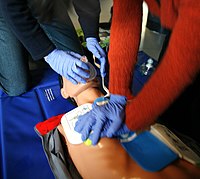
Computational cardiology: the bidomain based modified Hill model incorporating viscous effects for cardiac defibrillation
Sign Up to like & getrecommendations! Published in 2018 at "Computational Mechanics"
DOI: 10.1007/s00466-017-1495-z
Abstract: Working mechanisms of the cardiac defibrillation are still in debate due to the limited experimental facilities and one-third of patients even do not respond to cardiac resynchronization therapy. With an aim to develop a milestone… read more here.
Keywords: cardiology; bidomain based; defibrillation; cardiac defibrillation ... See more keywords

Defibrillation lessons commentary
Sign Up to like & getrecommendations! Published in 2018 at "Journal of Interventional Cardiac Electrophysiology"
DOI: 10.1007/s10840-018-0431-2
Abstract: Wilsmore et al. [1] remind us that there can be unexpected consequences from cardioversion. They report a patient who sustained a vertebral fracture following cardioversion with 150-J biphasic. Rare prior reports employed highenergy shocks. Under… read more here.
Keywords: lessons commentary; defibrillation lessons; defibrillation; side rails ... See more keywords

Implantable vagus nerve stimulation system performance is not affected by internal or external defibrillation shocks
Sign Up to like & getrecommendations! Published in 2021 at "Journal of Interventional Cardiac Electrophysiology"
DOI: 10.1007/s10840-021-01050-7
Abstract: Autonomic regulation therapy (ART) for heart failure (HF) is delivered using vagus nerve stimulation (VNS), and has been associated with improvement in cardiac function and HF symptoms. VNS is delivered using an implantable pulse generator… read more here.
Keywords: vagus nerve; defibrillation shocks; system; defibrillation ... See more keywords

Effect of Defibrillation on the Performance of an Implantable Vagus Nerve Stimulation System
Sign Up to like & getrecommendations! Published in 2020 at "Journal of Cardiac Failure"
DOI: 10.1016/j.cardfail.2020.09.454
Abstract: Background Vagus Nerve Stimulation delivers Autonomic Regulation Therapy (ART) for heart failure (HF), and in a pilot study has been associated with improvement in heart rate, heart rate variability, left ventricular function, 6-minute walk distance,… read more here.
Keywords: nerve stimulation; system; defibrillation; vagus nerve ... See more keywords

The Purkinje network plays a major role in low-energy ventricular defibrillation
Sign Up to like & getrecommendations! Published in 2022 at "Computers in biology and medicine"
DOI: 10.1016/j.compbiomed.2021.105133
Abstract: BACKGROUND During ventricular fibrillation (VF), targeting the excitable gap (EG) of reentry throughout the myocardium with low-energy surface stimulation shows promise for painless defibrillation. However, the Purkinje network may provide alternative pathways for reentry to… read more here.
Keywords: defibrillation; low energy; purkinje network; network ... See more keywords

Therapy From a Novel Substernal Lead: The Acute Extravascular Defibrillation, Pacing, and Electrogram (ASD2) Study
Sign Up to like & getrecommendations! Published in 2018 at "JACC: Clinical Electrophysiology"
DOI: 10.1016/j.jacep.2018.11.003
Abstract: Abstract Objectives The ASD2 (Acute Extravascular Defibrillation, Pacing, and Electrogram) study evaluated the ability to adequately sense, pace, and defibrillate patients with a novel implantable cardioverter-defibrillator (ICD) lead implanted in the substernal space. Background Subcutaneous… read more here.
Keywords: defibrillation pacing; extravascular defibrillation; study; defibrillation ... See more keywords

Amplitude spectrum area: The "clairvoyance" during resuscitation in the era of predictive medicine.
Sign Up to like & getrecommendations! Published in 2017 at "Resuscitation"
DOI: 10.1016/j.resuscitation.2017.09.011
Abstract: Evidenc e exists for ventricular fibrillation (VF) waveform hanges over time as reflection of the metabolic status of the yocardium during cardiac arrest and cardiopulmonary resusitation (CPR) [1]. Thus, quantitative electrocardiogram (ECG) aveform analysis during… read more here.
Keywords: medicine; amplitude spectrum; amsa; cpr ... See more keywords

The effect of dispatcher-assisted cardiopulmonary resuscitation on early defibrillation and return of spontaneous circulation with survival.
Sign Up to like & getrecommendations! Published in 2019 at "Resuscitation"
DOI: 10.1016/j.resuscitation.2019.01.004
Abstract: BACKGROUND Dispatcher-assisted cardiopulmonary resuscitation (DA-CPR) programs are implemented to augment bystander CPR and improve outcomes of patients with out-of-hospital cardiac arrest (OHCA). To understand the pathway of how DA-CPR improves outcomes of OHCA, we aimed… read more here.
Keywords: cpr; defibrillation; bystander cpr; rosc ... See more keywords

The impact of double sequential external defibrillation on termination of refractory ventricular fibrillation during out-of-hospital cardiac arrest.
Sign Up to like & getrecommendations! Published in 2019 at "Resuscitation"
DOI: 10.1016/j.resuscitation.2019.04.038
Abstract: BACKGROUND Despite significant advances in resuscitation efforts, there are some patients who remain in ventricular fibrillation (VF) after multiple shocks during out-of-hospital cardiac arrest (OHCA). Double sequential external defibrillation (DSED) has been proposed as a… read more here.
Keywords: standard defibrillation; defibrillation; rosc; ventricular fibrillation ... See more keywords

Shorter defibrillation interval promotes successful defibrillation and resuscitation outcomes.
Sign Up to like & getrecommendations! Published in 2019 at "Resuscitation"
DOI: 10.1016/j.resuscitation.2019.08.022
Abstract: AIM Current cardiopulmonary resuscitation guidelines recommend performing defibrillation every 2 minutes during resuscitation. This study aimed to compare the rate of successful defibrillation using 1- and 2-minute defibrillation intervals. METHODS Twenty-six pigs were randomly assigned to… read more here.
Keywords: successful defibrillation; defibrillation; minute interval; interval ... See more keywords

INCREASED SHOCK IMPEDANCE IS ASSOCIATED WITH FAILED SUBCUTANEOUS IMPLANTABLE CARDIOVERTER DEFIBRILLATOR DEFIBRILLATION THRESHOLD TESTING
Sign Up to like & getrecommendations! Published in 2017 at "Journal of the American College of Cardiology"
DOI: 10.1016/s0735-1097(17)33740-3
Abstract: Background: The Subcutaneous Implantable Cardioverter Defibrillator (S-ICD) is indicated for patients who have a standard indication for a transvenous implantable cardioverter defibrillator (T-ICD) without the need for cardiac pacing. While recent literature questions the utility… read more here.
Keywords: implantable cardioverter; subcutaneous implantable; cardioverter defibrillator; defibrillation ... See more keywords